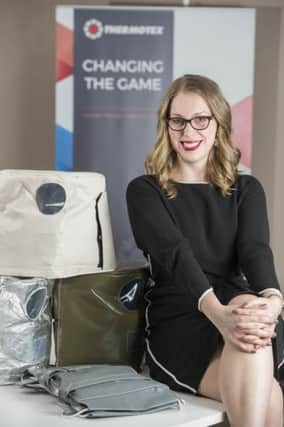How boss Chloe, 25, dragged Thermotex into modern world


Chloe Watmore was a 22-year-old economics graduate with no manufacturing experience when she joined thermal engineering firm Thermotex.
The Chesterfield-based company had five staff, no growth plans and and was making bespoke and customised products by hand with pencils, scissors, tape measures and sewing machines.
Advertisement
Hide AdAdvertisement
Hide AdHer aim was to gain some work experience in business development as she job hunted for her dream corporate role with Apple or Google in London.
But she quickly saw an opportunity to grow the business and her parents handed over the reins.
Miss Watmore, now managing director, revolutionised the factory’s processes, cleared the company of negativity and built a new team of young professionals.
She has grown international trade and led the company to record growth, doubling its revenue to over £3m.
Advertisement
Hide AdAdvertisement
Hide AdThe 25-year-old has won numerous awards and is now targeting £15m turnover for the business by 2020.
Thermotex’s custom-designed thermal insulation, heat tracing and bespoke protective casings maintain correct temperatures for equipment and pipework relied on by global clients in the energy, oil and gas markets, the industrial, automotive, residential and commercial property sectors and food producers and medical specialists.
Soon after joining, Miss Watmore and her father won the company’s largest project to date: a Russian contract to supply 3,000 bespoke pieces to YAMAL liquefied Natural Gas, the world’s largest oil and drilling refinery.
Thermotex insulation jackets were needed to protect sensitive valve actuators from freezing.
Advertisement
Hide AdAdvertisement
Hide AdBut to fulfill the order, the company needed to dramatically improve its manufacturing techniques and Miss Watmore was persuaded to stay and complete the task.
“Resistance to change was huge,” she said. “From their point of view, I was only 22, I wasn’t an engineer and I had no work experience. I was just Daddy’s Girl, punching above her weight.
“I used to go home and cry. But mum and dad understood my vision and supported me.”
She invested £100,000 to replace machinery and introduced computerised systems.
Advertisement
Hide AdAdvertisement
Hide AdFaster, smarter working increased manufacturing capacity five-fold.
Those who didn’t want to embrace the changes left. Chloe replaced them with people who could grow with the company. Speaking to The Yorkshire Post, Miss Whatmore said: “The other day someone said to me, you must be fearless, but I don’t think of it like that. I can be very strong-willed but growing up I was shy.”
During the evolution of Thermotex, the YAMAL order doubled to over 6,000 units, a value of £3m, and the Russians announced they needed the products six months early.
“Most normal people would have said you can’t do this,” said Miss Watmore. “But we decided to go for it.”
Advertisement
Hide AdAdvertisement
Hide AdToday 85 per cent of the products Thermotex manufactures are for international customers requiring winterisation, solar, sound or chemical protection products.
Miss Watmore is investing in more technology and automating some of its design processes to attract more overseas business.
She will be heading to Canada, Copenhagen, The Middle East and China this year to explore new markets and aims to forge links with Sheffield’s universities and world-leading companies resident at the AMP in Rotherham.
“Innovation is the key,” she said. “We need to look at how to show leadership in our field and part of that has to come from innovation and talking to universities about how to work together with their academic base.”
Female presence
Advertisement
Hide AdAdvertisement
Hide AdUnlike many traditional engineering firms, 80 per cent of Thermotex’s workforce are women.
Managing director Chloe Watmore said: “I’m an advocate of women in engineering and I have a passion for gender equality.
“We are actually keen to recruit more men to balance things out a bit.”
Miss Watmore said she often recruits from outside the industry, favouring people with the right attitude rather than the exact skill set needed.
Advertisement
Hide AdAdvertisement
Hide Ad“You can give people new skills but the right attitude is crucial,” she added.
“I think women are probably encouraged by the fact that there are other women working here and to some extent it is a safe haven for them in a male-dominated industry.”